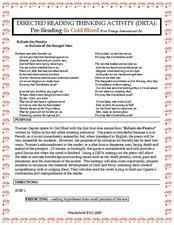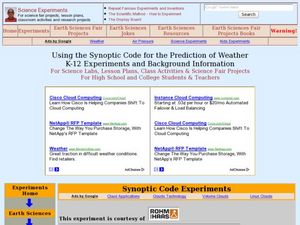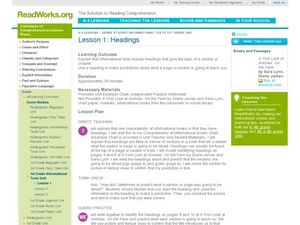Curated OER
Listening to Gather Evidence in a Reading Selection
Fourth graders explore an Ethiopian folktale, "Fire on the Mountain." In this literature instructional activity, 4th graders evaluate and record the evidence, as well as make predictions about what they think will happen. Students...
Curated OER
Advanced Algebra: Do You Feel Lucky?
Young scholars explore the realm of mathematical probability while playing a game of chance. after constructing paper rockets, they fire it enough times to determine the probabilities of the rocket traveling past a marked distance and...
Curated OER
Reading The Flag Maker
Learners explore The Flag Maker. In this reading comprehension lesson, students listen to the book The Flag Maker, making predictions and answering questions during the reading. Learners locate facts and opinions within the book and...
Curated OER
Talking About Photographs
Students ask questions and make predictions about photographs that they are shown. In this asking questions and communication lesson plan, students do this with teacher provided photographs and photographs they have brought in themselves.
Curated OER
Do You Feel Lucky?
Students calculate simple probabilities using mathematics then roll dice to test their predictions.
Curated OER
The Cause & Effect Model
Students analyze the plot of the story, "The Little Engine That Could" to provide a model for writing creatively, developing critical essays, producing themes, and making predictions.
Curated OER
Parachute Drop
Learners will have fun creating a parachute to collect data with. They will construct the parachute in small groups, measure the materials, and create an observation sheet. Then they drop the parachute and make predictions about how long...
Curated OER
Collecting Data to Learn About the People Around You
Human graphs, anyone? Did you eat fruit today? What is your favorite costume? Have your K – 6 learners graph the responses. Early elementary grades may count and compare while upper grades compare responses of different groups or make...
Center for Learning in Action
Water—Changing States (Part 1)
Here is part one of a two-part lesson plan in which scholars investigate the changing states of water—liquid, solid, and gas. With grand conversation and up to three demonstrations, learners make predictions about what they think will...
Curated OER
Goldilocks and the Three Bears
Explore storyboards with your pre-reader using the familiar story "Goldilocks and the Three Bears." They look at pictures as you read the captions in a comic book style. At the end, they try to finish the story based on a resolution...
Curated OER
Introduce: Cause and Effect
Introduce beginning readers to cause and effect in a story by exploring it together. Learners make predictions about a book based on its cover, title, and a brief flip through the pages. They listen to an explanation of cause and effect...
Curated OER
Directed Reading Thinking Activity (DRTA): Pre-Reading In Cold Blood
Start your unit by reading the "Ballade des Pendus," by the character Villon. The class makes predictions, discusses what they might already know about the text, and reads the selection together. There are step-by-step plans detailed...
Curated OER
Using the Synoptic Code for the Prediction of Water
Students construct a thermoscreen for the experiment. In this earth science instructional activity, students make observations and interpret them using synoptic codes. They predict the weather based on gathered information.
Curated OER
Egg In a Bottle
In this scientific investigation worksheet, students observe a demonstration where paper is ignited and placed in a bottle with a hard-boiled egg at the opening. Students predict what will occur, they make observations and they make...
Curated OER
Microbiology Lesson
Learners collect water samples and use a microscope to find bacteria in the samples. They categorize the different bacteria they find, determine the number of colonies there are, and predict how the bacteria levels might affect animals...
Curated OER
Changing the End of a Story
Second graders re-write a story. In this alternate endings lesson, 2nd graders read Alexander and the Wind-Up Mouse, by Leo Lionni, stopping to discuss the events and predict what will happen next. Students work in groups to come up with...
Curated OER
Today's Weather
In this weather worksheet students complete an interactive activity and complete a series of short answer questions on temperature and weather fronts and predict the weather.
Curated OER
Baseball Saved Us Teacher’s Guide
Learners read the book "Baseball Saved Us" and respond to the story through writing activities. For this reading lesson, students create a chart of events which they predict will take place in the story. Learners then use their chart as...
Curated OER
Modal Practice
In this modal sentences worksheet, students read statements and choose from multiple choice modal sentences. Students write eight sentences.
Curated OER
Environmental Sun Prints
Students are introduced to the term environment as it relates to animals, plants or non-living objects. For this environmental lesson, students make sun prints of various small objects by placing them on photosensitive paper and exposing...
Curated OER
Use Information in Line, Bar, Circle, and Picture Graphs to Make Comparisons and Predictions
Eighth graders explore the concept of graphs. In this graphs lesson, 8th graders compare and contrast picture graphs, bar graphs, line graphs, and circle graphs. Students examine each type of graph and answer questions and make...
Curated OER
Process Skills Review: Observation, Inference, and Predictions
A simple worksheet asks science learners to define five terms and identify five statements as predictions, observations, or inferences. This would be a supportive assignment when introducing elementary-levle scientist to inquiry practices.
Curated OER
Headings
First graders discover how heading help us make predictions. The class discusses how informational text typically has heading that can aid them in determining what a chapter will be about. They read the heading and make predictions for...
Curated OER
Red Herrings
Sixth graders make predictions while reading The Westing Game. In this prediction and mystery lesson, 6th graders identify red herrings while reading and compare those clues with their predictions. Students complete a series of...
Other popular searches
- Make Predictions Line Graph
- Using Data to Make Predictions
- Reading Make Predictions
- Learn to Make Predictions
- Learning to Make Predictions
- Make Predictions Science
- Make Predictions Story
- Infering to Make Predictions
- Make Predictions Reading
- Inferring to Make Predictions

























